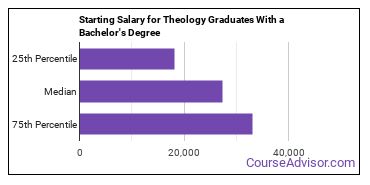Theological & Ministerial Studies
Featured schools near , edit
Types of Degrees Theological & Ministerial Studies Majors Are Getting
The following table lists how many theological and ministerial studies graduations there were in 2020-2021 for each degree level.
| Education Level | Number of Grads |
|---|---|
| Master’s Degree | 10,469 |
| Bachelor’s Degree | 2,603 |
| Doctor’s Degree | 1,586 |
| Graduate Certificate | 479 |
| Associate Degree | 366 |
| Basic Certificate | 227 |
| Undergraduate Certificate | 102 |
What Theological & Ministerial Studies Majors Need to Know
People with careers related to theology were asked what knowledge areas, skills, and abilities were important for their jobs. They weighted these areas on a scale of 1 to 5 with 5 being the highest.
Knowledge Areas for Theology Majors
Theology majors often go into careers in which the following knowledge areas are important:

- Philosophy and Theology - Knowledge of different philosophical systems and religions. This includes their basic principles, values, ethics, ways of thinking, customs, practices, and their impact on human culture.
- English Language - Knowledge of the structure and content of the English language including the meaning and spelling of words, rules of composition, and grammar.
- Education and Training - Knowledge of principles and methods for curriculum and training design, teaching and instruction for individuals and groups, and the measurement of training effects.
- History and Archeology - Knowledge of historical events and their causes, indicators, and effects on civilizations and cultures.
- Sociology and Anthropology - Knowledge of group behavior and dynamics, societal trends and influences, human migrations, ethnicity, cultures and their history and origins.
Skills for Theology Majors
When studying theology, you’ll learn many skills that will help you be successful in a wide range of jobs - even those that do not require a degree in the field. The following is a list of some of the most common skills needed for careers associated with this major:

- Speaking - Talking to others to convey information effectively.
- Active Listening - Giving full attention to what other people are saying, taking time to understand the points being made, asking questions as appropriate, and not interrupting at inappropriate times.
- Reading Comprehension - Understanding written sentences and paragraphs in work related documents.
- Instructing - Teaching others how to do something.
- Writing - Communicating effectively in writing as appropriate for the needs of the audience.
Abilities for Theology Majors
Some of the most crucial abilities to master while a theology student include the following:

- Oral Expression - The ability to communicate information and ideas in speaking so others will understand.
- Speech Clarity - The ability to speak clearly so others can understand you.
- Written Comprehension - The ability to read and understand information and ideas presented in writing.
- Written Expression - The ability to communicate information and ideas in writing so others will understand.
- Oral Comprehension - The ability to listen to and understand information and ideas presented through spoken words and sentences.
What Can You Do With a Theological & Ministerial Studies Major?
People with a theology degree often go into the following careers:
| Job Title | Job Growth Rate | Median Salary |
|---|---|---|
| Clergy | 8.2% | $48,990 |
| Philosophy and Religion Professors | 12.3% | $71,890 |
| Religious Workers | 7.7% | $29,820 |
Who Is Getting a Bachelor’s Degree in Theological & Ministerial Studies?
Racial-Ethnic Diversity
At the countrywide level, the racial-ethnic distribution of theology majors is as follows:

| Race/Ethnicity | Number of Grads |
|---|---|
| Asian | 54 |
| Black or African American | 144 |
| Hispanic or Latino | 279 |
| White | 1,839 |
| International Students | 82 |
| Other Races/Ethnicities | 205 |
Geographic Diversity
Theology appeals to people across the globe. About 3.2% of those with this major are international students. The most popular countries for students from outside the country are:
- South Korea
- Canada
- China
- India
- Vietnam
How Much Do Theological & Ministerial Studies Majors Make?
Bachelor’s Degree Starting Salary
Data from the U.S. Department of Education shows that theological and ministerial studies students who graduated in 2017-2019 with a bachelor’s degree made a median starting salary of $27,374 per year. During this timeframe, most salaries fell between $18,251 (25th percentile) and $33,021 (75th percentile).

It’s important to note that just because the people reporting these salaries have a degree in theology, it does not mean that they are working in a job related to their degree.
Salaries According to BLS
Theology majors often go into careers where salaries can range from $35,860 to $82,420 (25th to 75th percentile). This range includes all degree levels, so you may expect those with a more advanced degree to make more while those with less advanced degrees will typically make less.
To put that into context, according to BLS data from the first quarter of 2020, the typical high school graduate makes between $30,000 and $57,900 a year (25th through 75th percentile). The average person with a bachelor’s degree (any field) makes between $45,600 and $99,000. Advanced degree holders make the most with salaries between $55,600 and $125,400.
Amount of Education Required for Careers Related to Theological & Ministerial Studies
Some careers associated with theology require an advanced degree while some may not even require a bachelor’s. Whatever the case may be, pursuing more education usually means that more career options will be available to you.
How much schooling do you really need to compete in today’s job market? People currently working in careers related to theology have obtained the following education levels.

| Education Level | Percentage of Workers |
|---|---|
| Less than a High School Diploma | 0.5% |
| High School Diploma - or the equivalent (for example, GED) | 0.1% |
| Associate’s Degree (or other 2-year degree) | 0.1% |
| Bachelor’s Degree | 12.0% |
| Post-Baccalaureate Certificate - awarded for completion of an organized program of study; designed for people who have completed a Baccalaureate degree but do not meet the requirements of academic degrees carrying the title of Master. | 4.0% |
| Master’s Degree | 40.5% |
| Post-Master’s Certificate - awarded for completion of an organized program of study; designed for people who have completed a Master’s degree but do not meet the requirements of academic degrees at the doctoral level. | 0.4% |
| Doctoral Degree | 36.8% |
| Post-Doctoral Training | 6.2% |
Online Theological & Ministerial Studies Programs
In the 2020-2021 academic year, 482 schools offered some type of theological and ministerial studies program. The following table lists the number of programs by degree level, along with how many schools offered online courses in the field.
| Degree Level | Colleges Offering Programs | Colleges Offering Online Classes |
|---|---|---|
| Certificate (Less Than 1 Year) | 0 | 0 |
| Certificate (1-2 years) | 30 | 6 |
| Certificate (2-4 Years) | 7 | 4 |
| Associate’s Degree | 59 | 27 |
| Bachelor’s Degree | 100 | 23 |
| Post-Baccalaureate | 0 | 0 |
| Master’s Degree | 566 | 133 |
| Post-Master’s | 34 | 0 |
| Doctor’s Degree (Research) | 87 | 13 |
| Doctor’s Degree (Professional Practice) | 59 | 7 |
| Doctor’s Degree (Other) | 41 | 8 |
Is a Degree in Theological & Ministerial Studies Worth It?
The median salary for a theology grad is $53,290 per year. This is based on the weighted average of the most common careers associated with the major.
This is 34% more than the average salary for an individual holding a high school degree. This adds up to a gain of about $267,800 after 20 years!

Top Ranking Lists for Theological & Ministerial Studies
Explore Major by State
Alabama
California
District of Columbia
Idaho
Kansas
Maryland
Mississippi
Nevada
New York
Oklahoma
South Carolina
Utah
West Virginia
Alaska
Colorado
Florida
Illinois
Kentucky
Massachusetts
Missouri
New Hampshire
North Carolina
Oregon
South Dakota
Vermont
Wisconsin
Majors Related to Theological & Ministerial Studies
You may also be interested in one of the following majors related to theology.
| Major | Number of Grads |
|---|---|
| Biblical Studies | 4,119 |
| Pastoral Counseling & Specialized Ministries | 3,116 |
| Religious Education | 1,417 |
| Missionary Studies | 1,220 |
| Theology & Religious Vocations (Other) | 1,166 |
| Sacred Music | 554 |
| Religious Institution Administration and Law | 35 |
References
*The racial-ethnic minorities count is calculated by taking the total number of students and subtracting white students, international students, and students whose race/ethnicity was unknown. This number is then divided by the total number of students at the school to obtain the racial-ethnic minorities percentage.
- College Factual
- College Scorecard
- National Center for Education Statistics
- O*NET Online
- U.S. Bureau of Labor Statistics
- Usual Weekly Earnings of Wage and Salary Workers First Quarter 2020
- Image Credit: By Jonund under License
More about our data sources and methodologies.
Featured Schools
 Request Info
Request Info
|
Southern New Hampshire University You have goals. Southern New Hampshire University can help you get there. Whether you need a bachelor's degree to get into a career or want a master's degree to move up in your current career, SNHU has an online program for you. Find your degree from over 200 online programs. Learn More > |

